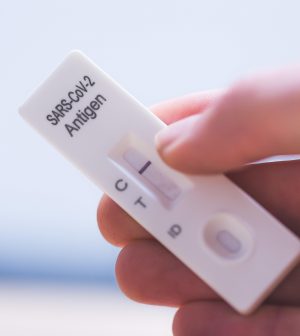- Could Your Grocery Store Meat Be Causing Recurring UTIs?
- Are You Making This Expensive Thermostat Error This Winter?
- Recognizing the Signs of Hypothyroidism
- 10 Strategies to Overcome Insomnia
- Could Artificial Sweeteners Be Aging the Brain Faster?
- Techniques for Soothing Your Nervous System
- Does the Water in Your House Smell Funny? Here’s Why
- Can a Daily Dose of Apple Cider Vinegar Actually Aid Weight Loss?
- 6 Health Beverages That Can Actually Spike Your Blood Sugar
- Treatment Options for Social Anxiety Disorder
COVID Home Test Kits Less Effective With Omicron Variant: Study

Rapid at-home COVID tests have become less reliable with the emergence of the Omicron variant, new research suggests.
Only one of three widely used rapid antigen tests met World Health Organization (WHO) standards for accuracy, Dutch researchers report.
For the study — published Sept. 14 in The BMJ — they tested nearly 6,500 people with COVID symptoms who visited one of three test sites in the Netherlands between late December and early February.
All participants underwent a PCR test at the testing site. PCR tests are analyzed in a lab and look for genetic material from the SARS-CoV-2 virus, making them the gold standard for COVID testing.
Patients were then asked to take a rapid antigen test at home within three hours of their test site visit. Antigen tests look for antibodies the body produces to fight COVID. They are less accurate than PCR tests but provide immediate results.
Researchers found that the sensitivity of three rapid antigen tests — the ability to correctly identify a true positive sample — declined as Omicron became the dominant variant.
Sensitivity fell from 87% to 81% for Flowflex; from 83% to 76% for MPBio; and from 80% to 67% for Clinitest, results showed. WHO standards require at least 80% sensitivity for a test. (Researchers noted that the observed declines were statistically significant only for Clinitest.)
Antigen tests require a person to swab their nose to test. When a throat swab was added to a nasal test, it boosted sensitivity of MPBio from 70% to 83% and Clinitest from 70% to 77%, researchers noted.
They said rapid antigen test manufacturers should consider adding a throat swab to their home kits.
In the meantime, people with COVID symptoms shouldn’t trust a negative self-test result, because a false negative can’t be ruled out, researchers added. Instead, folks should stick to general preventive measures to protect those around them.
More information
The Cleveland Clinic has more about the types of COVID tests.
SOURCE: The BMJ, news release, Sept. 14, 2022
Source: HealthDay
Copyright © 2026 HealthDay. All rights reserved.










